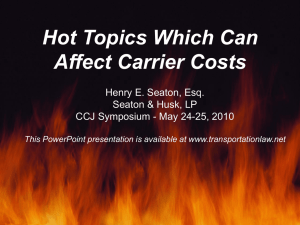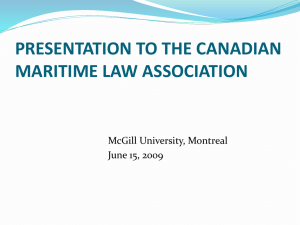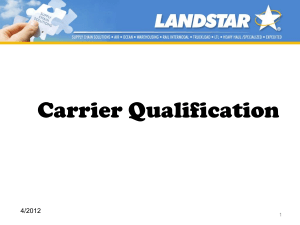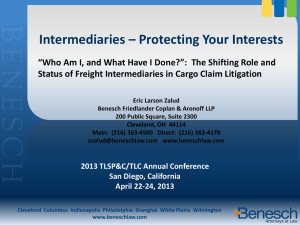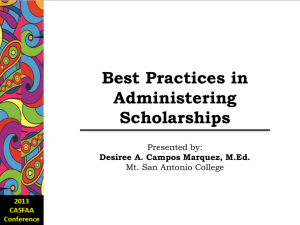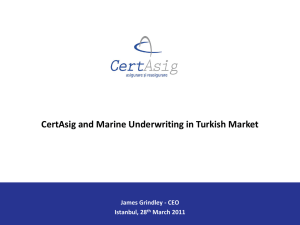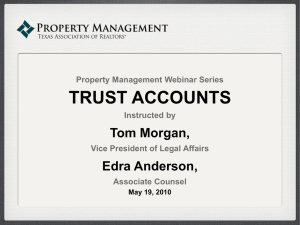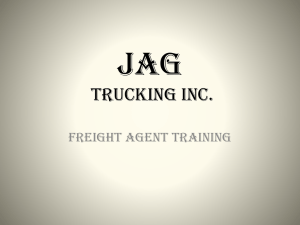IMUA - The Law Office of Seaton & Husk, LP
advertisement
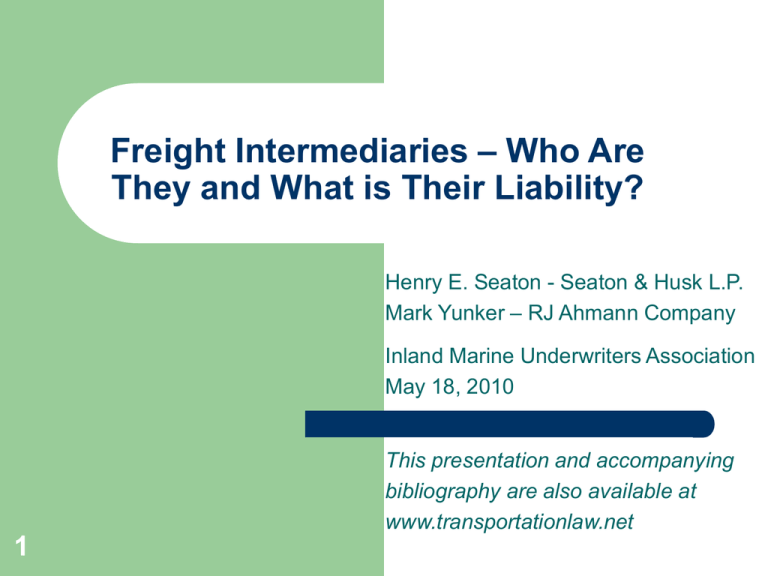
Freight Intermediaries – Who Are They and What is Their Liability? Henry E. Seaton - Seaton & Husk L.P. Mark Yunker – RJ Ahmann Company Inland Marine Underwriters Association May 18, 2010 This presentation and accompanying bibliography are also available at www.transportationlaw.net 1 I. Deregulation Deregulation changed the role of the intermediary, created regulatory chaos and frustrates proper claim resolution. 2 A. Different Liability Standards by Mode - different liability standards exist by mode and by the nature of the intermediary. B. Contracts basically trump established precedent and case law. C. Traditional intermediaries have become “quasicarriers” particularly in truckload segments. 3 II. Review of Modal Inconsistencies 4 A. Motor Carriers/Single Mode Traditionally governed by the Carmack Amendment (49 U.S.C. 14706), full actual value subject to release rate declaration 5 Truckload Segment. Typically truckload carriers accept unlimited liability, freight rate is not dependent upon either weight or susceptibility to damage. LTL. Traditional pricing based upon released valuation and susceptibility to damage. Small Package (UPS/FedEx). Fairly limited liability exclusions. B. Ex Air 6 Expedite and Substituted Motor for Air. 50 cents per pound liability established by custom and usage. See KPX v. Transgroup Worldwide, 2006 U.S. Dist. LEXIS 6772. Motor Carrier Ex Air. 50 cents per pound per article established by airlines and substitute carriers after deregulation International Air. Based on country of origin and destination. Could be $9.07 per pound (Warsaw), 17 SDRs or 19 SDRs. C. Ex Water 7 COGSA, $500 per package (compare wine vats and string bikinis) Rotterdam Treaty pending Himalaya and Clause Paramount intended to extend COGSA inland but see Kirby/Sompo and Regal-Beloit Freight carriers should limit liability under release rates and Carmack to avoid issue. See Intermodal Cartage Co. v. Natuzzi Americas, Inc., 2005 U.S. Dist. LEXIS 42208 (W.D. Tenn. Oct. 3, 2005) D. Ex Rail 8 Rail Circular AAR 50 reverses carrier packing and bracing liability Staggers Act Contracts E. NAFTA 9 US outbound unlimited Carmack Contract changes landscape; U.S. carriers typically will not accept liability for shipments moving south of border Mexican carriers typically do not have insurance and claims adjudication is poor Mexico outbound de minimis Canada outbound $2.00 per pound (CDA) Shipper can contract around Canada & Mexican limits III. Adding to the Chaos – The Various Types of Intermediaries by Mode 10 1. Truck Only Intermediaries Freight Forwarder. Regulated freight forwarder accepts cargo liability under Carmack Property Broker - arranges for transportation and then hires authorized carrier (49 C.F.R. 371): Under 49 C.F.R. 371 (b)(1) property broker cannot represent itself as carrier unless it holds carrier authority Broker not liable for cargo loss or damage under Carmack. Truck Broker – arranges for transportation of exempt produce, typically accepts cargo liability by offset 11 2. Ex Air Intermediaries 12 a. Air Freight Forwarder/IAC regulated by TSA. Issues air waybill and accepts cargo liability, typically hires motor carrier and air provider. b. Customs Broker. Acts as agent arranging for transportation of air shipments, typically eschews cargo liability. 2. Ex Water Intermediaries 13 a. NVOCC. Accepts ocean carrier liability, issues bill of lading, can extend liability inland through Himalaya and Clause Paramount, and by contract increase accepted liability via through bill. b. OFF. Acts as broker, arranger of ocean shipments 2. Ex Rail Intermediaries a. 14 Ex Rail. Intermodal marketing company or IMC resells space on trains, attempts to eschew cargo liability claiming intermediary status; only prior or subsequent motor carrier service is exempt. Question: So what does the above analysis suggest? One size does not fit all? Answer: Legal liability and risk exposure varies greatly by mode, the identity of the intermediary and its holding out and, in a deregulated world, the contractual liability which the intermediary accepts by written contract or by its course of dealing. 15 Truckload Brokerage – the Most Troublesome and Dynamic Area of Concern 16 Economic factors exacerbating truckload brokerage cargo issues: Deregulation proliferated the number of new carriers in the market segment to over 600,000 Filed rate doctrine fiasco led shippers to insist on waiver of tariffs and use of contracts which trump Carmack Shippers frustrated by price and poor claims history turn to 3PLs or brokers to arrange for transportation Brokers marketed the following: – – – 17 Cheap rates using transactional carriers in the spot market Protection against vicarious liability Assurance that claims would be timely paid Working on a 15-25% gross margin, property brokers became “quasi-carriers” accepting carrier duties and indemnity obligations When Instrumentalities of Federal Transportation Law Lose Meaning 18 Brokers market themselves as carriers Carriers hire other carriers to handle excess capacity Shipper wants indemnity for everything Brokers erroneously assume carrier duties in shipper contracts Carriers Are Not BrokersBrokers Are Not Carriers 19 A. Carriers Are Not Brokers 1. When they arrange for transportation they are legally bound to transport – 49 C.F.R. 371.2 / 49 U.S.C 13102(2) 2. Carriers, like freight forwarders, have indemnity recourse to carrier in possession at time of loss - 49 U.S.C. 14706(b) Landair Transport, Inc. v. Schneider National Carriers, Inc., 2009 U.S. Dist. LEXIS 103495, 2009 WL 3423037 (N.D. Tex.) 20 A. Brokers Are Not Carriers 21 1) Broker regulations provide it is a “misrepresentation” for broker to claim carrier status 49 C.F.R. 371.11 2) Broker cannot hold out to provide transportation unless it is also licensed and registered as a carrier - 49 U.S.C. 13904(b) C. Roles of Carrier & Broker are Muddled by “Deregulation” 22 (1) Federal Government “transportation service provider” (2) Shipper Contracts – Vicarious liability / assume safety duties (3) Fodder for plaintiff’s bar Vicarious Liability of Property Brokers 23 Liability Travels Up The Supply Chain “Pigs get fat, Hogs get slaughtered.” 24 PLAINTIFF’S BAR MAKES BIG BROKER THE TARGET 25 State Law Theories 1. 2. 3. 4. 26 Non delegable duty of carrier Broker accepts carrier duties Joint venture Negligent selection (or hiring) Vicarious Liability 27 See Schramm v. Foster, 2004 U.S. Dist. Lexis 16875 (D.Md. August 23, 2004) Serna v. Pettey Leach Trucking, Inc., 110 Cal. App. 4th 1475 (Cal. App. 2d Dist. 2003) Ill. Bulk Carrier, Inc. v. Jackson, 2009 Ind. App. LEXIS 900 (Ind. Ct. App. June 16, 2009) Defending Vicarious Liability Suits A. B. C. D. E. F. 28 “A Different Point of View” at http://www.transportationlaw.net/pdf/different_point _of_view-in_transit11-07.pdf Plantiff’s misuse of SafeStat - not fit for public consumption Carrier is solely responsible for safety compliance Broker only required to hire licensed and authorized motor carriers Federal preemption of state law Unrated carriers / “presumed safe” Second Guessing Not Required 29 CSA 2010 – Problem with “At Risk” Carriers Needs Fixing Contingent Auto Cargo Liability 30 Large brokers feel need for contingent auto cargo liability Increasingly shippers insist upon it So What is Due Diligence? 31 “Licensed, authorized & insured or more?” When Brokers Are Sued For Unintended Cargo Liability A. 32 Hornbook Law - Brokers are not liable where their status is clear (1) Chubb Group of Insurance Companies v. H.A. Transportation Systems, Inc., 243 F. Supp. 2d 1064 (C.D.Cal. 2002) (2) Rexroth Hydraudine v. Ocean World Lines, Inc., 2008 U.S. App. Lexis 23078, 547 F. 3d. 351 (2d. Cir. 2008) (3) Hewlett-Packard v. Brother’s Trucking and Salem Logistics, 373 F. Supp 2d 1349 (S.D. Fla. 2005) (4) Professional Communications, Inc. v. Contract Freighters, Inc., 171 F. Supp. 2d. 546, 550 (D. Md. 2001) (5) Milan Express Co., Inc. v. Western Surety Co., 886 F, 2d. 783, 784 (6th Cir. 1989) - Role of broker defined When Brokers Are Sued For Unintended Cargo Liability B. But if broker acts like carrier or accepts cargo duties, Courts have imposed liability (1) (2) (3) (4) (5) 33 Broker named as carrier on Bill - Zima Corp. v. M.V. Roman Pazinski, 493 F.Supp 268 (SDNY 1980) Broker holds out to be carrier - Hewlett-Packard v. Brother’s Trucking and Salem Logistics, 373 F. Supp 2d 1349 (S.D. Fla. 2005) Shipper’s “Understanding” – Custom Cartage v. Motorola, 1999 WL 965686*9 (N.D. Ill. 1999) Broker bills for freight charges, not showing broker status – Delta Research Corporation v. EMS, Inc. 2005 WL 20900890 CGU Int’l v. Keystone Lines. 2004 WL 1047982 (N.D. Cal 2004 But See: 34 Tokio Marine & Fire Insurance Co. Ltd. v. Megatrux, Inc., 2006 Cal. App. Unpub. Lexis 6964 (2006) - Broker named as Carrier on bill not fatal Traveler’s Indemnity Co. v. “Hanjin Kwangyang” et. al.,1995 WL 539635 (S.D.N.Y.1995) Toledo v. Van & Waters Rogers Inc., 92 F. Supp. 2d 44, 55, (D.R.I. 2002) Fireman’s Fund Insurance Company a/s/o Expack Seafood, Inc. v. ATS Logistics Services, Inc., et. al., 2009 U.S. Dist Lexis 65870 (S.D. Tex. 2009) American Home Assurance Company v. Forward Air, Inc., 130 F.3d 443 (11th Cir. 1997) Risks Can Be Significant 35 (1) NY Case pending - $800,000 sought for Broker / Carrier had only $100,000 (2) KY Case pending - $2.7 Million cargo loss; Carrier has $100,000 release rate If Shipper contracts can trump general principles of federal transportation law, what is the best advice for property brokers? 36 Answer: 37 Be an “arranger” not a provider of transportation Accept only the statutory duties of a broker. Do not accept direct liability for cargo loss or damage or safe operations of the contracted carrier’s equipment. Do not indemnify shipper for all loss to cargo. Require filing of claims with carrier and claims adjustment under Section 370. Warrant only that claims for which the retained carrier is adjudged liable will be paid subject to an agreed limitation (e.g. $100,000 per truckload). Require payment of freight charges without offset. Offer TLA arbitration of disputed claims. Answer: (continued) Never let broker’s name appear as the carrier on bill of lading (a) (b) 38 Insure carrier hired by broker issues bills Direct shipper in contract to show Broker as third party bill-to in specific instructions What are the major pitfalls facing truckload brokers and their contingent cargo insurers? 39 Answer: 40 1) Shippers require broker to accept carrier duties 2) Shippers insist on right of setoff 3) Shippers discard Carmack in favor of “reject it, crush it, and dump it” waiving obligation to mitigate 4) Scourge of double brokerage 5) Homer provisions 6) Subrogation problem against undercapitalized carrier with spotty coverage Pitfalls in Accepting Carrier Duties 1. 41 Claims Process Short Circuited a) No cargo inspection b) No mitigation c) No formal claims Pitfalls in Accepting Carrier Duties (continued) 2. Broker insists on right of setoff – Broker’s duty of constructive trust is violated – Money to broker for services performed without claim by other carriers is offset against claim from offending carrier. – Broker is left in violation of fiduciary obligation to receive funds in trust. – Claims procedures are short circuited as shipper becomes judge and jury of claim. – Offset cram-down by broker on small carrier results in spiral of death for small carriers 42 Pitfalls in Accepting Carrier Duties (continued) 3. 43 Reject it, crush it, and dump it – Shipper contracts quickly outweigh reject it, crush it, and dump it (particularly prevalent in foodstuffs, missing seal cases) – Makes hash of claims procedures – Insurer cannot underwrite liability when shipper has “sole discretion” not subject to reasonableness standard – Broker cannot get shipper’s insurer to pay unadjusted claim – D&M Carriers Inc v. Bruce Alan Reed, 5:07-cv-00877 (W.D.OK) – Dairy Farmers v. Prairie Lakes Logistics Broken Seal No inspection allowed Cheese fed to hogs Special & Consequential Damages “Hire me a jet plane to Mexico” 44 Scourge of double brokerage Results when carrier accepts shipment from broker and tenders to another carrier Most cargo policies exclude coverage for subcontracted carrier although it is actually an interline for which carrier is liable. See Landair Transport, Inc. v. Schneider National Carriers, Inc., 2009 U.S. Dist. LEXIS 103495, 2009 WL 3423037 (N.D. Tex.) Carrier in possession and control may have no insurance or specific vehicle endorsement (Dupre) 45 Homer Provision Carmack permits federal court access where claim occurred. Homer provision freight resolution forces broker to forum where carrier may not be found (Alabama broker example) 46 Undisclosed Policy Loopholes Which Frustrate Broker Recourse to Carrier Cargo Insurance Acord is worthless Loopholes 1. 2. Wetness, flatbed, tarp endorsement doesn’t fix Temperature damage, refrigerated foodstuffs, reefer breakdown doesn’t fix Theft – – – 47 Unattended vehicle Unguarded lot Not “in transit” argument Unattached trailer not covered – – – – – – – Co-insurance No claim made by insured Replacement value / not file actual value Shipment not on specified vehicle Undisclosed deductible Failure to mitigate No duty to defend / double suit required So what does a truckload broker actually need to be assured that the retained carrier’s insurance contains no exclusion term or condition which would preclude recovery? 48 Answer: 49 Broker must either grade out insurers or insist on a BMC-34-like endorsement Clear understanding of contingent coverage including underwriter review of contracts TLA arbitration by contractual agreement with shipper, carrier, and contingent cargo to avoid legal fees Conundrums Facing Underwriters of Contingent Liability Insurance 50 Do you provide contractual indemnity/does this require you to review every contract? Is contractual legal liability more than Carmack? If you provide contractual indemnity and/or Carmack, do you restrict the broker’s use to carriers with approved cargo insurance or accept a simple Acord from an insurer you know has loopholes? Examine refrigerated exclusions for reefer carriers. At what point do you become involved and how do you gain assurance that the carrier’s insurer accepts liability and will not assert privity of contract as a nonpayment defense. So How Do You Handicap Risk With Writing Contingent Broker Policies? 51 On a load-by-load (shipper by carrier) basis – a task too arduous By insisting brokers accept only Carmack/legal liability warranties for the performance of their underlying carriers and require the underlying carriers to have approved insurance subject to a per truckload limitation Raise BMC-32 endorsement to reasonable truckload level applied to all cargo regardless of contract and modify Acord warranties provided by carrier to broker Where Do We Go From Here? How to reduce uninsured risk Use Carmack as a standard. Failed request on behalf of broker to have carrier underwriters clearly disclose loopholes and exceptions. Leads to gold star program in which preference is given to carriers whose insurer: – – – 52 certifies policy does not contain primary exclusions agrees to fine endorsement equipment agrees to BMC-32 in the amount of 100K Underwriters for contracted carriers hold insurance with same underwriter as contingent cargo and agree to extend coverage through additional insured endorsement. Program is currently being explored with major underwriters and insurance brokers. Where Do We Go From Here? (continued) Education Start with agent Candor on policy coverage Establish contract review procedures Approve standard contract/website terms Educate intermediary – – – – 53 Release rate Cargo carrier out from indemnity language Carmack and 370 Warrant payment only in event carrier and insurer fail to pay subject to agreed limit A bibliography of additional sources and cites is available at: http://www.transportationlaw.net/webinars.html Question and comments can be directed to Henry Seaton at info@transportationlaw.net Thank you! 54
